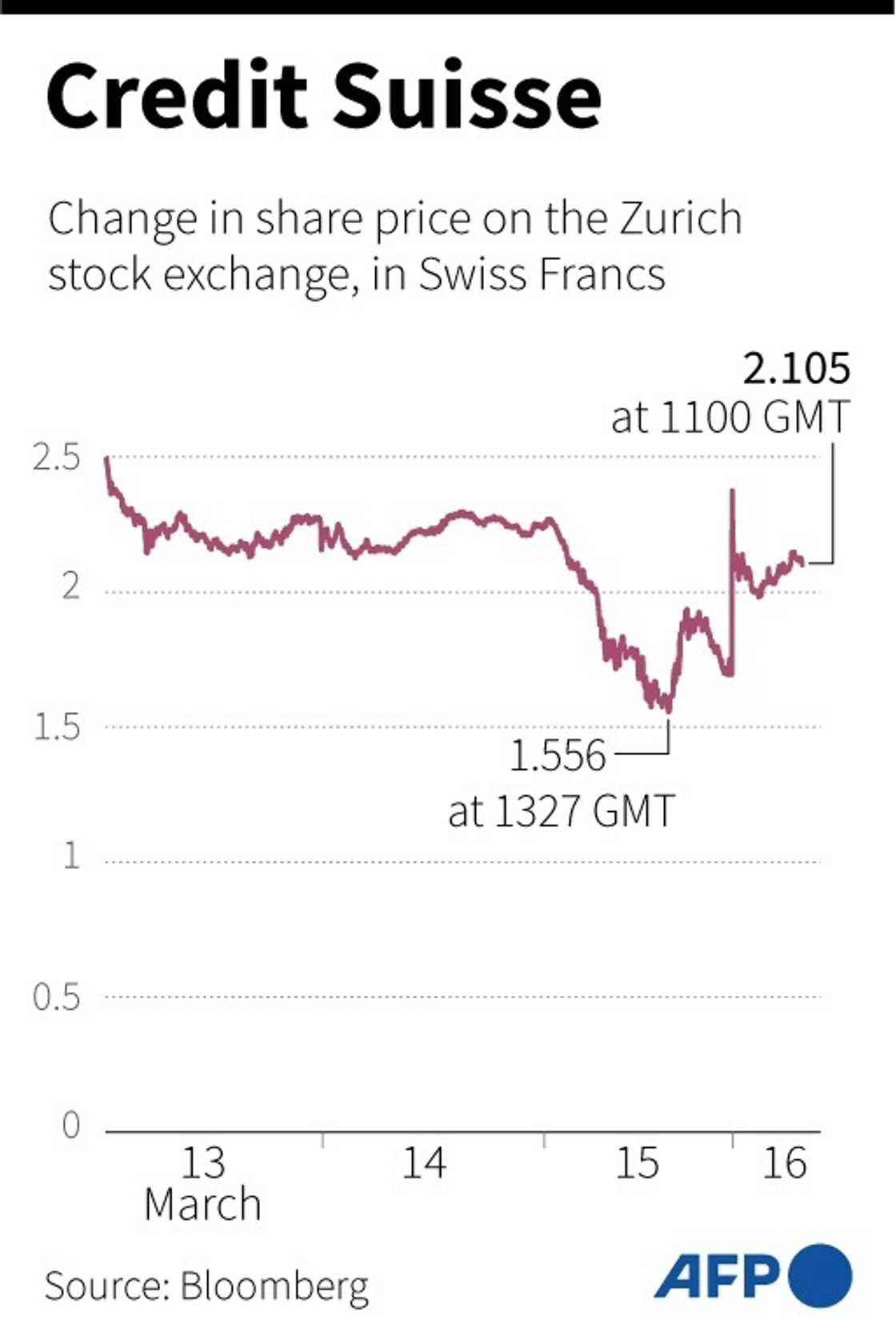Credit Suisse bounces back but investors still cautious

Source: AFP
PAY ATTENTION: Enjoy reading our stories? Join YEN.com.gh's Telegram channel for more!
Credit Suisse rallied on the stock market Thursday after grabbing a $54 billion central bank lifeline in a bid to restore investor confidence but analysts remain wary about the major lender's future.
Switzerland's second-biggest lender suffered its worst-ever day on the stock exchange Wednesday as market fears over the risk of another global banking crisis swirled, after US tech industry lenders Silicon Valley Bank and Signature Bank imploded.
Share prices plunged more than 30 percent to 1.55 Swiss francs, pushing the Swiss National Bank to come to the rescue in a bid to reassure the markets.
Hours before the stock exchange reopened, Credit Suisse announced Thursday that it would borrow 50 billion francs from the SNB to reinforce the group.
The embattled bank said it was also making buyback offers on about $3 billion worth of debt.
"These measures demonstrate decisive action to strengthen Credit Suisse as we continue our strategic transformation to deliver value to our clients and other stakeholders," chief executive Ulrich Koerner said in a statement.
PAY ATTENTION: Follow us on Instagram - get the most important news directly in your favourite app!
"My team and I are resolved to move forward rapidly to deliver a simpler and more focused bank built around client needs."
The moves seemed to have some effect: at 1200 GMT, Credit Suisse shares were up 22 percent at 2.07 at Swiss francs.
'Too big to fail'
The Swiss government -- yet to say anything on the situation -- was set to hold a special meeting on Thursday to discuss Credit Suisse, the national news agency ATS reported.
The SNB loan to Credit Suisse came after the central bank and the Swiss financial regulator FINMA issued a joint statement on the global situation.

Source: AFP
"The problems of certain banks in the USA do not pose a direct risk of contagion for the Swiss financial markets," they insisted.
"Credit Suisse meets the capital and liquidity requirements imposed on systemically important banks," they said, referring to the requirements placed on the 30 banks worldwide deemed to be of global importance to the banking system.
These banks, deemed too big to fail, are required to set aside additional cash to withstand shocks in the event of market turbulence.
The regulatory requirements in Switzerland are even higher, given how heavily the banking sector weighs in the wealthy Alpine nation's economy.
Credit Suisse's CET1 ratio, which compares a bank's capital to its risk-weighted assets, stands at 14.1 percent -- slightly less than HSBC but more than that of BNP Paribas, which are among the largest banks in Europe.
Regaining trust
Andreas Venditti, an analyst at Swiss investment managers Vontobel, said the Swiss authorities' intervention was a "strong and important signal".
"We hope the measures will calm down markets and break the negative spiral," he said.
"However, it will take time to fully regain trust in the franchise," he added.
Credit Suisse is engaged in a major restructuring programme launched last October following a series of scandals that tarnished its reputation.
In February 2021, Credit Suisse shares were worth 12.78 Swiss francs, but since then, a barrage of problems has eaten away at its market value and undermined confidence in the rejig.
Credit Suisse plans to separate its investment banking arm from the rest of its activities, and refocus on wealth management, asset management and on its Swiss domestic banking.
But the bank has continued to suffer setbacks since then as investors grew impatient to see it put its house in order.
'Bad news counts double'
In its 2022 annual report released on Tuesday, Credit Suisse acknowledged "material weaknesses" in its internal controls on financial reporting.
"Credit Suisse seems to be the weakest and most vulnerable bank" in the investing universe, said analyst Dieter Hein of Baader Helvea, "for which every piece of bad news counts double".
As early as February, the bank said it expected a substantial pre-tax loss for 2023 even though it revealed a net loss of 7.3 billion Swiss francs for 2022.
When publishing its annual results, it also revealed massive withdrawals of money by its customers, amounting to 110.5 billion Swiss francs in the fourth quarter.
"The decision of FINMA and SNB should ease fears about negative effects in the banking system," said Christian Schmidiger, an analyst at Zurich Cantonal Bank.
"It remains questionable what effects the notification of the SNB will have on the dynamics of outflows of customer funds at Credit Suisse."
New feature: Сheck out news that is picked for YOU ➡️ click on “Recommended for you” and enjoy!
Source: AFP





